Future-Proof Your Business with Proactive Customer Support
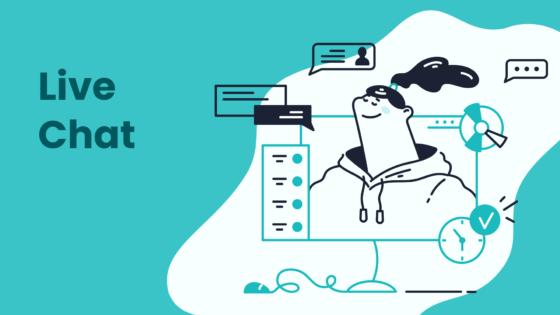
Proactive customer support is revolutionizing how businesses interact with their customers. By anticipating needs and addressing issues early, you can create experiences that stand out. Statistics show that by 2025, 89% of businesses will compete on customer experience, with 40% adopting proactive strategies to stay ahead. Customers increasingly value experience as much as products, making this shift essential for growth. Companies like Sobot empower you with tools like AI-powered Live Chat to deliver seamless, personalized support, ensuring you meet rising expectations and build lasting loyalty.
Understanding Proactive Customer Support
What Is Proactive Customer Support?
Proactive customer support involves anticipating customer needs and addressing potential issues before they arise. Instead of waiting for customers to reach out with problems, businesses take the initiative to provide solutions or helpful information. For example, banks often send alerts about upcoming credit card expirations, ensuring uninterrupted service. Similarly, companies like Amazon use anticipatory recommendations to suggest products based on past purchases, enhancing the overall experience.
This approach shifts the focus from reactive problem-solving to building trust and loyalty. By offering timely assistance, you can create a seamless customer journey that reduces frustration and fosters satisfaction. Tools like Sobot's Live Chat enable businesses to engage proactively across multiple channels, ensuring no customer is left behind.
Key Characteristics of Proactive Customer Service
Proactive customer service stands out due to its forward-thinking nature. Here are some defining traits:
- Anticipation of Needs: Businesses analyze data to predict customer behavior and offer tailored solutions. For instance, Spotify sends newsletters about new features, reducing the need for support inquiries.
- Personalized Engagement: Proactive communication, such as regular check-ins or personalized emails, strengthens relationships and prevents issues.
- Self-Service Options: With 81% of customers preferring self-service, tools like dynamic FAQs and AI-driven chatbots empower users to resolve issues independently.
- Proactive Monitoring: Companies use advanced analytics to identify potential problems early, ensuring swift resolutions.
Studies show that proactive employees and systems improve customer satisfaction and service quality. This approach also enhances job satisfaction for support teams, as they can focus on meaningful interactions rather than repetitive tasks.
Why Proactive Support Is Essential for 2025
The future of customer service lies in proactive strategies. By 2025, businesses leveraging predictive analytics can reduce service issues by 20% and increase customer loyalty by 30%. Proactive support not only minimizes churn by 15% but also boosts customer lifetime value. For example, AT&T uses personalized videos to explain billing processes, reducing confusion and support calls.
As customer expectations rise, proactive customer service becomes a competitive advantage. Tools like Sobot's omnichannel solutions help businesses unify communication, enabling effective customer communication and seamless engagement. By adopting these strategies, you can stay ahead of the curve and build lasting relationships with your audience.
Strategies for Success in Proactive Customer Support

Leveraging AI-Powered Personalization with Sobot Live Chat
AI-powered personalization transforms customer engagement strategies by tailoring interactions to individual preferences. Sobot Live Chat excels in this area, offering tools that analyze customer data to deliver personalized experiences. For example, the platform uses AI to segment customers based on their behavior, enabling agents to provide targeted solutions. This approach not only improves efficiency but also fosters loyalty by making customers feel valued.
The effectiveness of AI personalization is evident in the metrics achieved by Sobot Live Chat. Businesses using this tool report a 96% increase in positive feedback and a 97% customer satisfaction score. Additionally, AI resolves 22.2% of self-service questions, reducing inbound discussion volume by 20%. These results demonstrate how personalization enhances customer happiness and drives business growth.
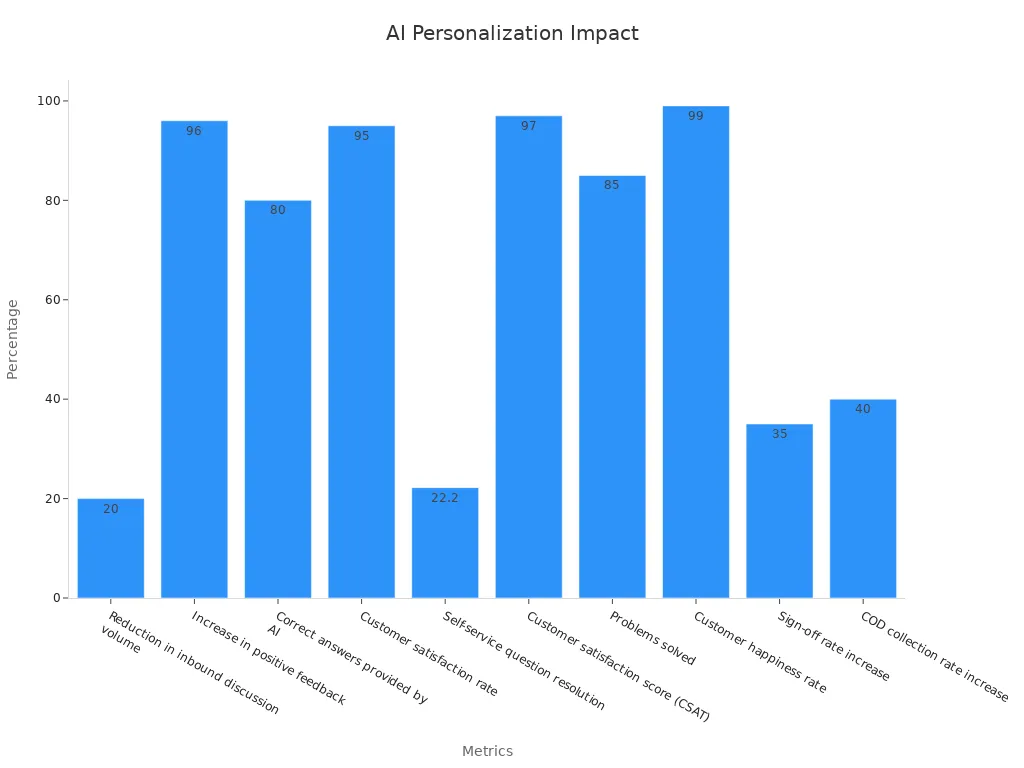
By leveraging AI-powered personalization, you can anticipate customer needs and deliver solutions proactively. Sobot Live Chat’s unified workspace ensures seamless communication across channels, making it easier to create personalized interactions that resonate with your audience.
Utilizing Predictive Analytics to Anticipate Customer Needs
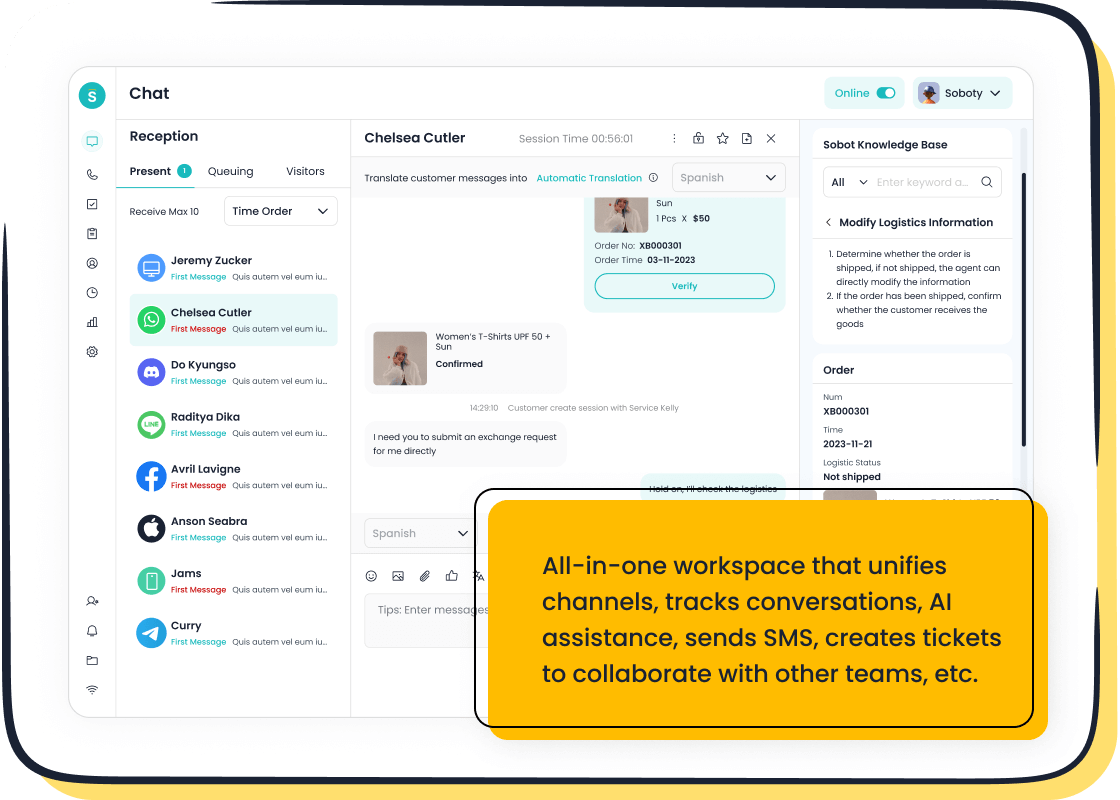
Predictive analytics is a cornerstone of effective strategies for proactive customer support. It enables businesses to analyze historical data and forecast future behaviors, ensuring timely interventions. Sobot’s solutions integrate predictive analytics to help you anticipate customer needs and reduce service disruptions.
Industries like financial services and healthcare have already embraced predictive analytics. Banks use it to detect fraud and predict inquiries, while healthcare providers send reminders for follow-ups to improve patient outcomes. Funck, an industry expert, highlights its impact: “The ability to process and analyze massive amounts of customer data in real-time is game-changing. It allows businesses to transition from reactive to truly proactive, creating seamless and satisfying customer journeys.”
Sobot’s tools empower you to apply predictive analytics effectively. For instance, retail businesses can use AI-driven recommendations to predict purchases, increasing conversion rates. Telecommunications companies can anticipate service disruptions and communicate proactively, enhancing customer satisfaction. By adopting predictive analytics, you can stay ahead of customer expectations and build trust.
Building an Omnichannel Support Strategy with Sobot Solutions
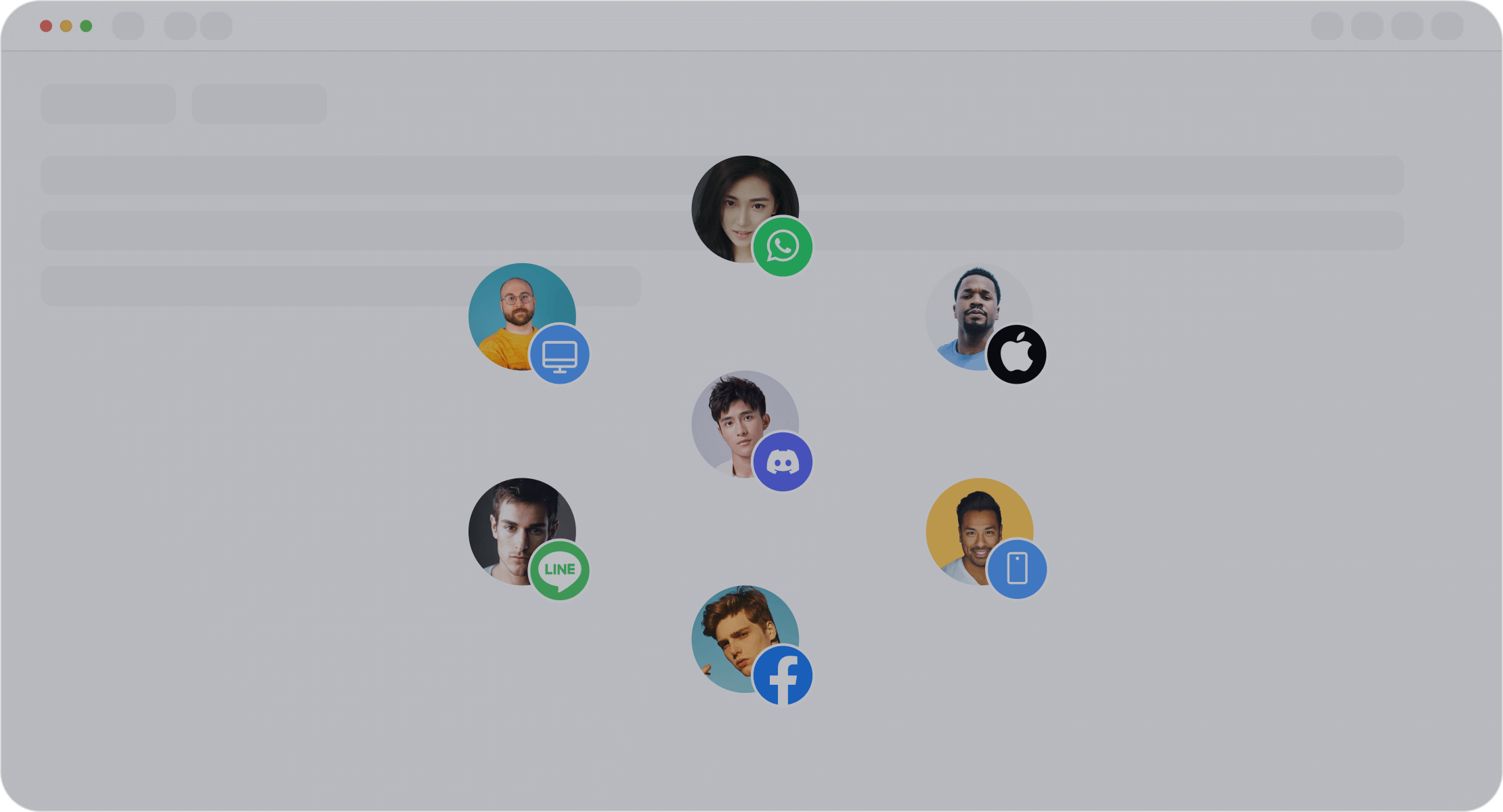
An omnichannel support strategy ensures consistent and connected experiences across all customer touchpoints. Sobot’s Omnichannel Solution simplifies this process by unifying communication channels into a single platform. This integration allows you to manage interactions seamlessly, whether through voice, email, or social media.
Statistics confirm the benefits of omnichannel strategies. Customers with connected experiences spend 4.6 times more than those without. Additionally, companies offering consistent services see a 27% increase in loyalty, while inconsistent services lead to a 65% drop. These figures highlight the importance of delivering personalized experiences across channels.
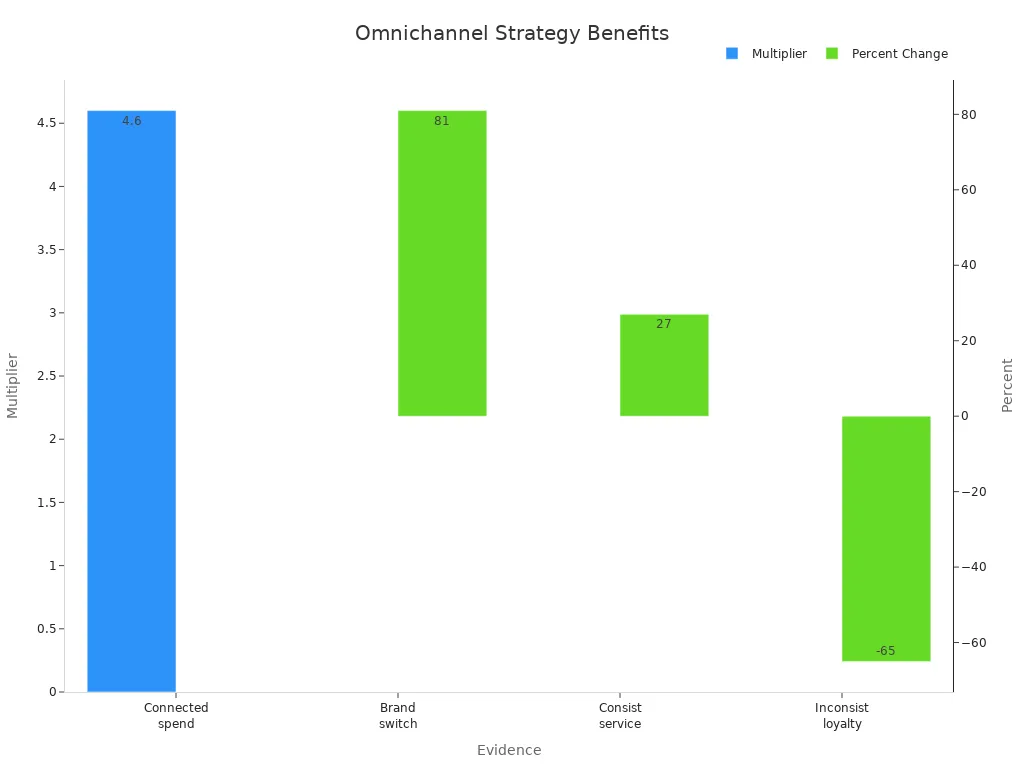
Sobot’s Omnichannel Solution enhances customer engagement strategies by integrating AI-driven automation and analytics. It reduces agent workload by 30%, enabling your team to focus on meaningful interactions. By adopting this solution, you can provide proactive support that meets customer expectations and drives loyalty.
Proactive Engagement Through Notifications and Alerts
Proactive engagement through notifications and alerts allows you to address customer needs before they even realize them. By keeping your customers informed, you can reduce confusion, build trust, and improve satisfaction. Notifications about order updates, service disruptions, or account activity demonstrate that you care about their experience.
For example:
- A telecom company used proactive network monitoring to notify customers about service disruptions. This approach increased customer satisfaction scores by 15%.
- An e-commerce retailer implemented a chatbot to track order deliveries. This reduced inquiries about order status by 30%.
- A financial institution introduced mobile app alerts for unusual account activity. This feature significantly reduced fraud-related losses.
These examples highlight how proactive communication fosters trust and loyalty. Sobot’s solutions, such as Live Chat and Omnichannel platforms, enable you to send timely alerts across multiple channels. Whether it’s a shipping update or a reminder about an expiring subscription, these tools ensure effective support and seamless engagement.
Proactive notifications also reduce the workload on your support team. A software company that released tutorial videos saw fewer related support queries. This demonstrates how proactive measures can decrease ticket volumes while improving customer satisfaction. By adopting these strategies, you can foster proactive engagement and create a more connected customer experience.
Establishing Customer Success Programs for Long-Term Loyalty
Customer success programs focus on helping your customers achieve their goals. These programs go beyond solving problems—they aim to build lasting relationships. By guiding customers toward success, you can increase retention, reduce churn, and boost lifetime value.
Key metrics illustrate the benefits of customer success programs:
| Metric | Description |
|---|---|
| Customer Retention Rate | Percentage of customers who continue to engage with the brand over a specified period. |
| Churn Rate | Rate at which customers stop doing business with the brand, indicating areas for improvement. |
| Customer Lifetime Value (CLV) | Total revenue expected from a customer over their entire relationship with the brand. |
| Net Promoter Score (NPS) | Measures customer satisfaction and loyalty based on their likelihood to recommend the brand. |
Sobot’s customer success tools, such as AI-powered analytics and unified workspaces, help you track these metrics effectively. For instance, you can monitor CLV to identify high-value customers and provide them with tailored support. Similarly, tracking NPS allows you to measure loyalty and make improvements where needed.
By establishing a customer success program, you can create a proactive customer success strategy that aligns with your business goals. This approach not only enhances satisfaction but also strengthens loyalty. Companies that prioritize customer success often see higher retention rates and increased revenue. With Sobot’s solutions, you can implement these programs seamlessly and ensure long-term success.
The Role of Technology in Enhancing Customer Experience

AI and Machine Learning for Predictive Insights
AI and machine learning have transformed how businesses predict customer behavior and improve customer experience. By analyzing historical data, these technologies identify patterns that help you anticipate customer needs. For instance, predictive analytics can forecast when a customer might require support or make a purchase. This allows you to offer personalized service before they even ask for it.
AI-powered tools like Sobot Live Chat use machine learning algorithms to segment customers based on their behavior. This segmentation enables you to deliver tailored solutions that resonate with individual preferences. For example, a retail business can predict which products a customer is likely to buy and recommend them proactively. This not only enhances satisfaction but also drives conversions.
Predictive analytics also improves decision-making. It shifts your approach from reactive to proactive, ensuring smoother customer journeys. By leveraging these insights, you can reduce service disruptions and foster loyalty. Businesses that adopt AI and machine learning gain a competitive edge by delivering seamless, personalized experiences.
Automation for Streamlining Proactive Customer Service
Automation simplifies customer service processes, making them faster and more efficient. Tools like chatbots and automated workflows handle repetitive tasks, freeing your team to focus on complex issues. For example, chatbots can answer FAQs instantly, reducing response times and improving customer satisfaction.
Sobot’s solutions integrate automation to optimize workflows. Features like automatic call distribution ensure customers connect with the right agent quickly. Real-time analytics provide insights into customer interactions, helping you identify trends and improve service quality. These tools not only enhance efficiency but also create a more personalized service experience.
Consider these benefits of automation:
- Chatbots reduce the need for human intervention, allowing agents to focus on meaningful interactions.
- Automated systems minimize wait times, ensuring prompt service.
- Real-time analytics help you optimize workflows and identify areas for improvement.
By adopting automation, you can streamline operations and deliver proactive support that meets customer expectations. This approach not only reduces costs but also enhances the overall customer experience.
Cloud-Based Platforms for Scalability and Flexibility
Cloud-based platforms offer the scalability and flexibility needed to meet evolving customer demands. These platforms allow you to manage customer interactions seamlessly, regardless of location or device. For example, companies like Netflix and Airbnb use cloud solutions to handle high traffic and deliver consistent service globally.
Sobot’s cloud-based solutions provide a unified workspace for managing customer interactions across multiple channels. This integration ensures smooth communication and efficient service delivery. Whether you’re scaling operations or adapting to new challenges, cloud platforms offer the agility you need.
Key advantages of cloud-based platforms include:
- Scalability: Easily handle increased customer inquiries during peak periods.
- Flexibility: Access customer data and tools from anywhere, enabling remote work.
- Performance: Improve service delivery with reliable infrastructure and real-time updates.
By adopting cloud-based platforms, you can enhance your customer experience while maintaining operational efficiency. These solutions empower you to stay agile and responsive in a competitive market.
Sobot's Unified Workspace for Seamless Customer Interactions
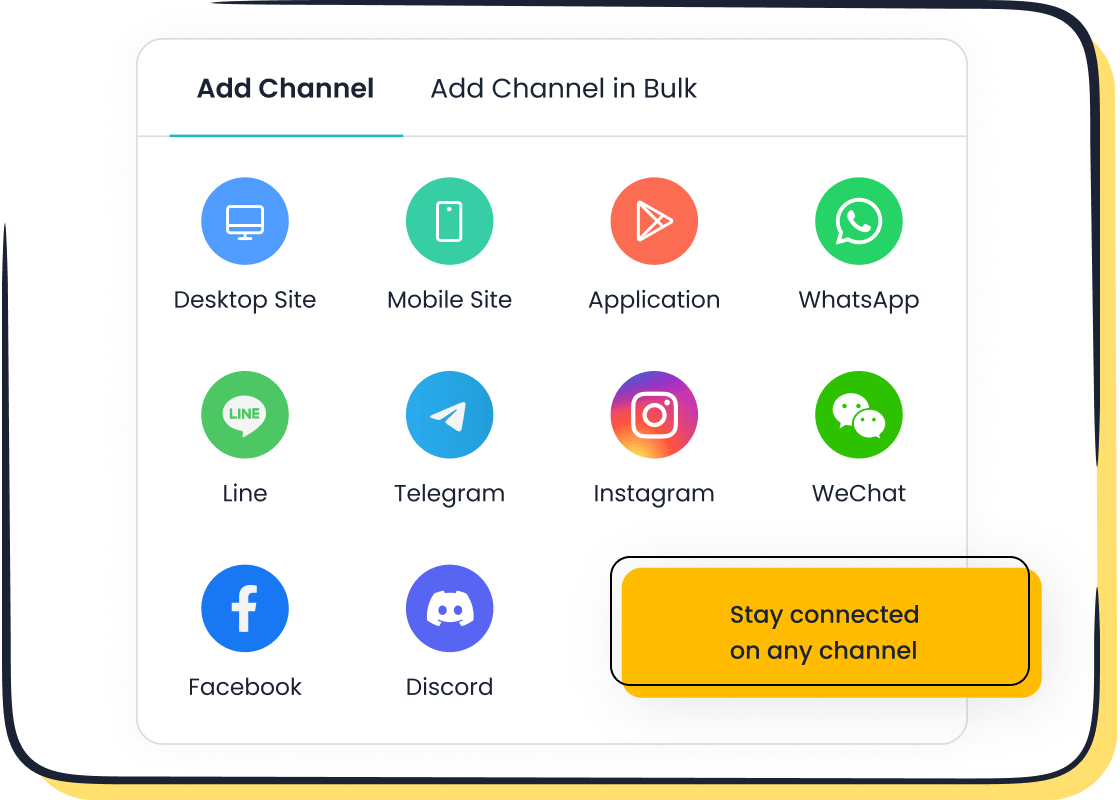
Managing customer interactions across multiple channels can feel overwhelming. Sobot’s Unified Workspace simplifies this process by bringing all communication into one centralized platform. This tool ensures that you can deliver consistent and personalized support without juggling between systems.
Key Features of Sobot’s Unified Workspace
Sobot’s Unified Workspace offers a range of features designed to streamline customer interactions:
- Omnichannel Integration: Connect with customers through websites, apps, social media, and messaging platforms like WhatsApp and Telegram.
- AI-Assisted Tools: Use intelligent assignment and workflow automation to improve efficiency.
- Unified Inbox: Access all customer messages, tickets, and data in one place for faster resolutions.
- Built-In Analytics: Evaluate over 150 indicators to optimize service and make data-driven decisions.
- Customizable Widgets: Match the workspace to your brand’s identity for a cohesive experience.
Tip: A unified workspace reduces the risk of missed messages and ensures every customer receives timely support.
Benefits of Using Sobot’s Unified Workspace
The advantages of Sobot’s Unified Workspace go beyond convenience. It transforms how you interact with customers:
- Improved Efficiency: Agents save time by accessing all tools and data in one place.
- Enhanced Personalization: AI-powered segmentation helps you tailor responses to individual needs.
- Higher Satisfaction Rates: Faster resolutions and proactive engagement lead to happier customers.
- Scalability: Handle increased inquiries during peak periods without compromising service quality.
For example, OPPO, a global smart device leader, used Sobot’s Unified Workspace to integrate customer channels and business systems. This approach improved data accessibility and boosted their chatbot resolution rate to 83%, while achieving a 94% positive feedback rate. Learn more about OPPO’s success story.
How Sobot’s Unified Workspace Enhances Customer Interactions
Imagine a scenario where a customer reaches out via WhatsApp about a delayed order. With Sobot’s Unified Workspace, you can instantly access their previous interactions, order details, and preferences—all in one view. This allows you to provide a personalized update without switching between systems.
Additionally, the platform’s AI tools can suggest proactive solutions, such as offering a discount or expedited shipping. These features not only resolve issues quickly but also build trust and loyalty.
Note: Businesses using unified workspaces report a 30% increase in productivity and a 27% boost in customer loyalty.
Why Choose Sobot’s Unified Workspace?
Sobot’s Unified Workspace stands out because of its reliability and innovation. With a system stability rate of 99.99%, you can trust it to handle high volumes of customer interactions seamlessly. Its AI-driven tools and omnichannel capabilities empower you to deliver proactive support that meets modern customer expectations.
By adopting Sobot’s Unified Workspace, you can future-proof your business and create experiences that keep customers coming back. Ready to transform your customer interactions? Explore Sobot’s Unified Workspace.
Measuring the Success of Proactive Customer Support
Key Metrics for Evaluating Performance
To measure the success of proactive customer support, you need to track specific metrics that reflect your team's efficiency and your customers' experiences. These metrics help you identify areas for improvement and ensure your strategies align with customer expectations.
Here’s a table summarizing key metrics and how to measure them:
| Metric | Description | How to Measure |
|---|---|---|
| Customer Churn Rate | Measures the rate at which customers stop their relationship with a business. | Divide the number of customers lost during a specific period by the total number of customers at the beginning of that period. |
| First Response Time (FRT) | Measures the time taken for an agent to provide an initial reply. | Track the timestamp of when a customer inquiry is received and when the first response is sent. |
| Customer Satisfaction Score | Measures customer satisfaction with products and services. | Survey customers on a scale of 1 to 5 and calculate the percentage of positive responses. |
| Average Ticket Resolution Rate | Measures the percentage of customer inquiries successfully resolved. | Divide the number of resolved issues by the total number of inquiries received. |
| Customer Retention Rate | Indicates the percentage of customers who continue to do business over time. | Track the number of customers retained over a specific period. |
Tracking these metrics ensures you maintain high customer satisfaction while improving operational efficiency. For example, reducing your First Response Time can lead to quicker resolutions and happier customers.
Tracking Customer Lifetime Value (CLV) and Retention Rates
Customer Lifetime Value (CLV) and retention rates are critical for understanding the long-term impact of your customer support efforts. CLV estimates the net profit a customer brings to your business over their relationship with you. Retention rates, on the other hand, measure how well you keep customers engaged over time.
Studies show that increasing retention by just 5% can boost profits by at least 25%. Retaining customers also costs 5 to 7 times less than acquiring new ones. By focusing on retention, you not only save money but also build stronger relationships with your audience.
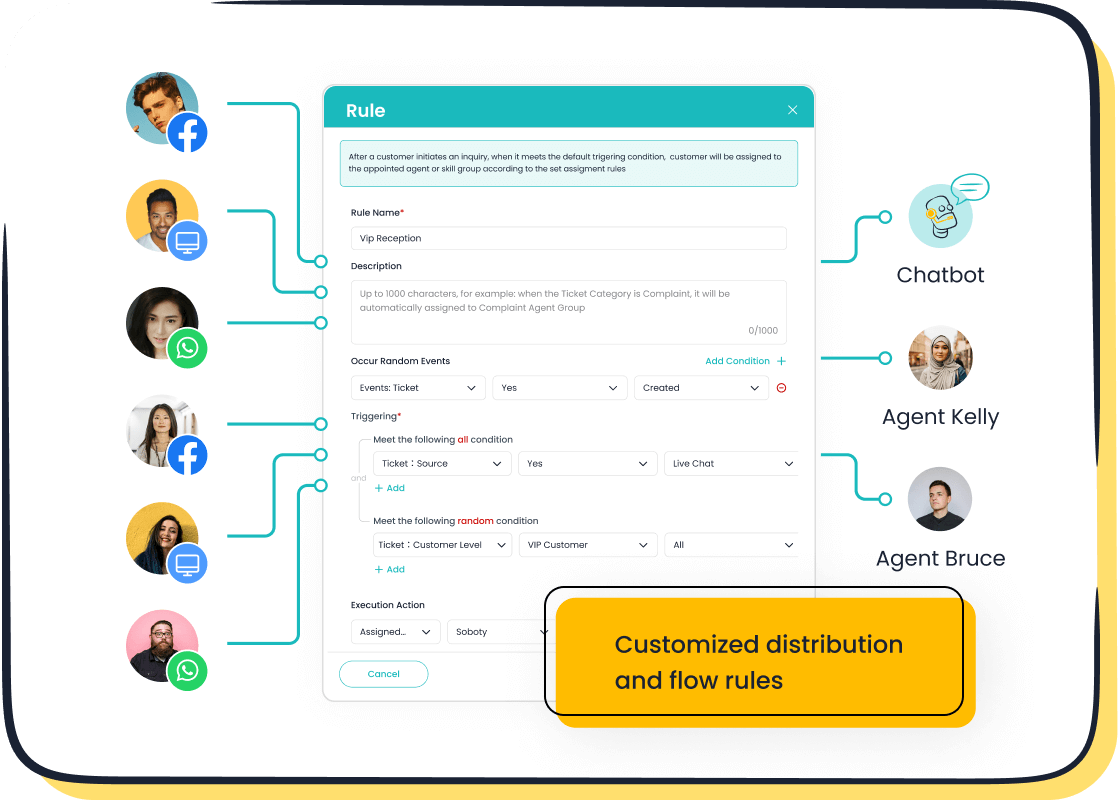
To improve retention, consider using tools like Sobot’s Live Chat to provide personalized, proactive support. For example, sending reminders about expiring subscriptions or offering tailored recommendations can enhance customer satisfaction and loyalty. Lowering churn rates through better support also increases CLV, driving sustainable growth for your business.
Using Net Promoter Score (NPS) to Gauge Loyalty
The Net Promoter Score (NPS) is a powerful tool for measuring customer loyalty. It reflects how likely your customers are to recommend your business based on their experiences. A higher NPS indicates stronger loyalty, which often results from effective proactive support strategies.
For instance, businesses that use Sobot’s omnichannel solutions often see improved NPS because they deliver seamless and personalized experiences. By addressing customer needs proactively, you can turn detractors into promoters, boosting your overall score.
Tracking NPS regularly helps you understand how well your support strategies resonate with your audience. It also provides actionable insights for improving customer satisfaction and fostering long-term loyalty.
Monitoring Customer Satisfaction (CSAT) for Continuous Improvement
Tracking customer satisfaction (CSAT) is essential for improving your service quality and building lasting relationships. CSAT measures how happy customers are with your products or services, offering valuable insights into areas that need attention. By monitoring this metric, you can identify trends, address pain points, and refine your strategies to meet customer expectations.
Proactive customer support plays a significant role in boosting satisfaction. Reaching out to customers before they encounter issues demonstrates care and builds trust. For example, live chat campaigns or direct messages on social media can resolve questions quickly, reducing frustration. This approach not only enhances satisfaction but also creates opportunities to improve your overall service.
Tip: Use tools like Sobot Live Chat to engage customers proactively. Its AI-powered analytics help you track CSAT scores and identify patterns, ensuring continuous improvement.
Strategies for Monitoring CSAT
To effectively monitor CSAT, consider these steps:
- Anticipate Needs: Offer support before problems arise. For instance, sending reminders about expiring subscriptions can prevent service interruptions.
- Gather Feedback: Actively solicit customer opinions through surveys or satisfaction ratings. Use this data to make informed decisions.
- Analyze Trends: Track CSAT scores over time to measure the impact of your strategies. Identify recurring issues and address them promptly.
Why CSAT Matters
Studies show that 88% of customers prefer self-service resources because they are fast and convenient. By providing proactive solutions, you can meet these expectations and improve satisfaction. For example, Sobot’s omnichannel solutions allow you to unify communication channels, ensuring seamless interactions. This integration reduces response times and enhances customer experiences, leading to higher CSAT scores.
Monitoring CSAT isn’t just about collecting data—it’s about using it to drive meaningful change. By acting on feedback and refining your approach, you can create a service experience that keeps customers coming back.
Future Trends Shaping Proactive Customer Support in 2025
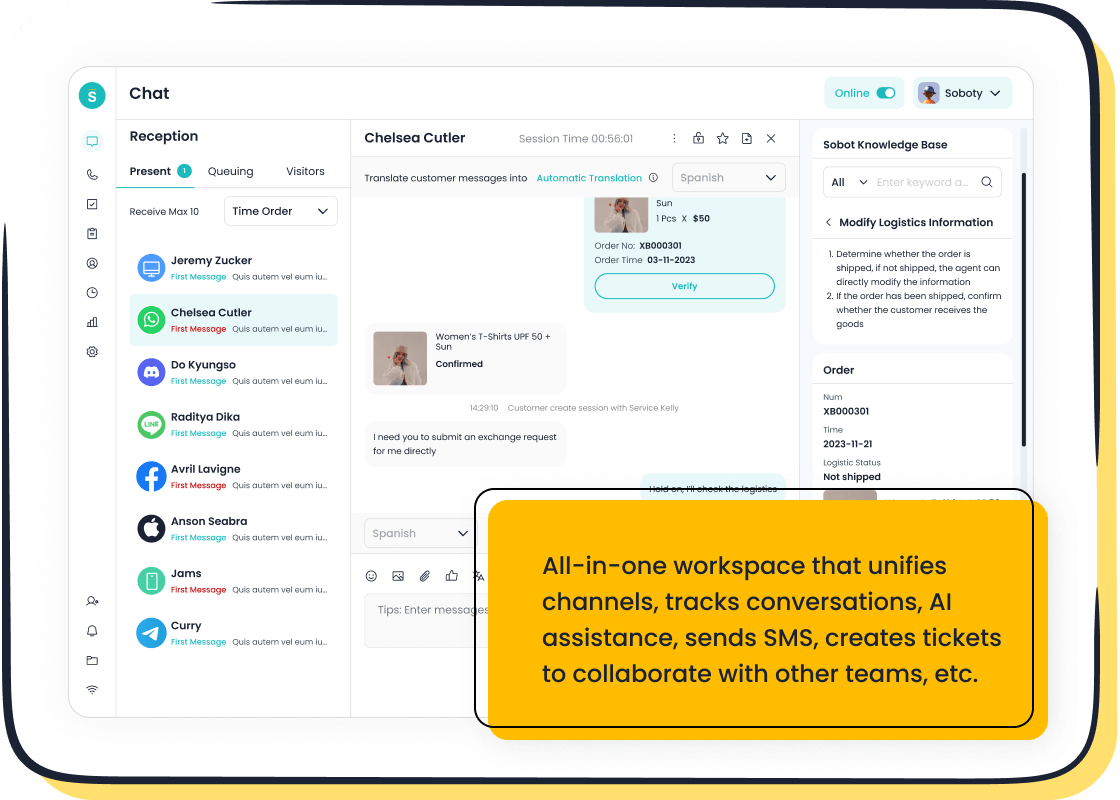
Hyper-Personalization Through Advanced AI
Hyper-personalization is transforming customer support by tailoring experiences to individual preferences. Advanced AI technologies analyze customer behavior in real time, enabling businesses to deliver highly relevant solutions. For example, e-commerce platforms use AI to adjust product recommendations instantly, ensuring customers see offers that match their interests. This approach significantly boosts conversion rates and customer satisfaction.
Businesses adopting Digital Experience Platforms (DXPs) have reported a 25% increase in customer engagement and a 20% rise in sales. By 2025, AI-driven personalization strategies are expected to enhance retail profitability by up to 15%. Tools like Sobot Live Chat empower you to implement hyper-personalization effectively. Its AI-powered segmentation identifies customer needs, allowing you to provide tailored support across multiple channels. This not only improves efficiency but also strengthens loyalty by making customers feel valued.
Tip: Use AI to share personalized tips and resources proactively. This enhances the customer experience and reduces the need for reactive support.
Immersive Customer Experiences with AR/VR
Augmented Reality (AR) and Virtual Reality (VR) are reshaping how customers interact with brands. These technologies create immersive experiences that deepen engagement and reduce uncertainty. For instance, AR allows customers to visualize products in their own environments, helping them make confident purchasing decisions. Similarly, VR enables virtual tours and online events, offering memorable brand interactions.
Companies leveraging AR/VR have seen stronger connections with their customers. These tools make shopping more interactive and reduce product uncertainty. Personalized XR content, tailored to individual preferences, further enhances relevance and satisfaction. Sobot’s omnichannel solutions can integrate AR/VR capabilities, ensuring seamless support during these immersive experiences. By adopting these technologies, you can foster loyalty and create standout moments for your audience.
Note: Immersive experiences not only enhance engagement but also position your brand as innovative and customer-focused.
Real-Time Engagement via Social Media Monitoring
Social media monitoring enables you to engage with customers in real time, addressing their needs instantly. Tracking metrics like mentions and hashtags helps you assess brand visibility and identify trends. Positive sentiment highlights what customers love, while negative sentiment pinpoints areas needing attention. This real-time feedback allows you to recalibrate strategies quickly and improve customer satisfaction.
Brands using social media monitoring tools often see spikes in engagement during viral campaigns. For example, timely responses to customer queries on platforms like Twitter or Instagram can boost loyalty and trust. Sobot’s omnichannel solutions streamline social media interactions, ensuring you never miss an opportunity to connect. By leveraging real-time insights, you can optimize your content and deliver proactive support that resonates with your audience.
Tip: Use automated triggers to respond to common inquiries on social media. This ensures timely engagement and reduces response times.
Ethical AI and Data Privacy in Proactive Support
Ethical AI and data privacy are critical pillars of proactive customer support. Customers today expect businesses to handle their data responsibly while delivering personalized experiences. Meeting these expectations requires transparency, robust privacy measures, and customer-centric AI practices.
When you prioritize strong privacy protections, you build trust with your audience. Companies that go beyond basic compliance often stand out. For example:
- Transparency has been shown to increase consumer trust. Southwest Airlines saw a 40% rise in app downloads, while HouseEazy achieved a 55% retention rate by adopting ethical AI practices.
- OpenAI’s success highlights the value of transparent AI governance. Their customer-first approach has become a benchmark for proactive customer support.
Proactive customer support also benefits from ethical AI. AI tools like Sobot Live Chat use customer data to provide tailored solutions, but they do so with privacy safeguards in place. Features like data encryption and customizable permissions ensure that sensitive information remains secure. This balance between personalization and privacy fosters loyalty and reduces churn.
Transparency plays a key role in proactive engagement. Informing customers about how their data is used builds confidence. For instance, businesses that disclose AI-driven decision-making processes often see higher satisfaction rates. By integrating ethical AI into your strategy, you can create a seamless experience while respecting customer privacy.
Sobot’s solutions exemplify this approach. With built-in analytics and AI-powered tools, you can deliver proactive support without compromising data security. These technologies not only enhance efficiency but also align with modern ethical standards. As customer expectations evolve, adopting ethical AI and prioritizing data privacy will help you stay ahead in 2025 and beyond.
Tip: Always communicate your data policies clearly. Customers value transparency and are more likely to trust businesses that prioritize their privacy.
Proactive customer support is no longer optional—it’s essential for future-proofing your business. Brands that embrace innovation and dynamic insights thrive in competitive markets. Proactive strategies not only enhance customer satisfaction but also improve retention and loyalty. For instance:
- 75% of consumers are willing to pay more for excellent customer experiences.
- Proactive service notifications are appreciated by 67% of customers, with 70% viewing brands more favorably when they reach out first.
Sobot empowers businesses to meet these expectations with cutting-edge tools like Live Chat and Omnichannel Solutions. These technologies streamline communication, personalize interactions, and ensure seamless engagement. By adopting proactive strategies, tracking key metrics, and leveraging tools like Sobot, you can stay ahead of trends and build lasting customer relationships in 2025 and beyond.
Tip: Start integrating proactive solutions today to unlock higher customer lifetime value and long-term success.
FAQ
1. What is proactive customer support, and how does it differ from reactive support?
Proactive customer support anticipates customer needs and addresses issues before they arise. Reactive support waits for customers to report problems. For example, Sobot’s Live Chat sends alerts about order updates, ensuring seamless experiences without waiting for inquiries.
2. How can Sobot’s Live Chat improve customer satisfaction?
Sobot’s Live Chat uses AI to provide personalized solutions instantly. It integrates customer data across channels, reducing response times. Businesses report a 97% satisfaction score and a 38% conversion increase after implementing this tool. Learn more.
3. Why is omnichannel support essential for proactive customer service?
Omnichannel support connects all communication channels into one platform. Sobot’s Omnichannel Solution ensures consistent experiences, whether through email, social media, or voice. Customers with seamless interactions spend 4.6 times more than those without.
4. How does predictive analytics help businesses anticipate customer needs?
Predictive analytics analyzes past data to forecast future behaviors. Sobot’s tools use this technology to predict inquiries and recommend solutions. For example, retail businesses can anticipate purchases, boosting conversion rates by 20%.
5. Can proactive customer support reduce operational costs?
Yes, proactive strategies like automation and AI-driven tools reduce repetitive tasks. Sobot’s solutions lower agent workloads by 30%, allowing teams to focus on complex issues. This improves efficiency and reduces costs while enhancing customer satisfaction.
See Also
Enhance SaaS Customer Support Using Live Chat Techniques
Round-The-Clock Live Chat Support Drives Business Growth
2024's Leading Customer Service Software Solutions Revealed
Excelling in Live Chat for Enhanced Customer Assistance
AI-Powered Customer Service Agents Transform Support Experience
